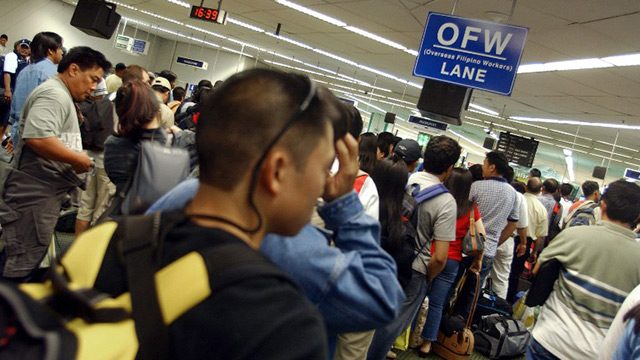SUMMARY
This is AI generated summarization, which may have errors. For context, always refer to the full article.
 DUBAI, United Arab Emirates – Even in the vastness of the Dubai airport, it was not difficult to locate the boarding gate. Like a trail of breadcrumbs, I only had to follow the sound of laughter and Pinoy banter that got louder the closer I got to the gate – it was more telling than any sign could be that I had indeed found the Dubai-Manila boarding gate.
DUBAI, United Arab Emirates – Even in the vastness of the Dubai airport, it was not difficult to locate the boarding gate. Like a trail of breadcrumbs, I only had to follow the sound of laughter and Pinoy banter that got louder the closer I got to the gate – it was more telling than any sign could be that I had indeed found the Dubai-Manila boarding gate.
A group of Filipinos, occupying two rows of chairs facing one another were making small talk. Judging from the context they added to their stories, they did not seem to have known each other before – not that it mattered. In a foreign land, the color of your skin, the sound of your words (and your accent) and even the shape of your nose identify you and give you an instant affinity and kinship to a fellow Filipino.
I found myself listening – eavesdropping, if you really want to be precise about it.
They were talking all at once, laughing in their excitement to finally be going home. It made me think back to Shakira Sison’s article about how OFWs are generous with life lessons and advice as it is the first time in a long time that they are being heard.
The women were sharing stories about their wards who were all “makukulit” (hyperactive) and how hard it was to discipline and watch over a rambunctious toddler whose language they sometimes did not understand.
“Makakauwi na din ako sa mga anak ko na kapareho ko ng salita. Magkakaintindihan kami,” one woman said. (At last, I will be able to go home to my children who speak the same language. We can understand one another.)
Could they understand one another, I wondered. Could they talk to one another? Did coping with the years apart mean getting used to parenting and being a child at an arm’s length – a distance that can be made shorter by a Viber message or Skype call.
The men worked at labor-intensive jobs at restaurants and construction sites and were looking forward to not having to lift anything heavier than a beer and some pulutan (finger food/bar chow) while on vacation.
I wondered if any of their fathers were part of the KATAS NG SAUDI era that paved the way for waves of labor migration that now spanned 40 years and included not just men, but women and an increasing number of young people who could not find local jobs that would match their skill set.
Just as young children say they want to be doctors when they grew up, I wondered if, as small boys, these men dreamt of going abroad. I wondered if going abroad was everything they thought it was.
The conversation shifted from work to family, who was going to pick them up at the airport, and they tried to outdo one another about whose “salubong” (welcoming party) would be bigger. One welcome party would be as big as a barrio, another a whole barangay.
“Nakaabang na si misis, ngayon pa lang,” laughed one man, noting that there was still an 8-hour flight to get through before landing on Philippine soil. (The wife is waiting for me as early as now.)
“Naku, pare. Nabili mo ba ang lahat ng bilin?” shot back another. (Bro, I hope you get everything she told you to buy for her.)
There would be other people to see and visit, old friends to catch up with, and “friends” that would come out of the woodwork once they arrived.
“Dumadami talaga ang mga kaibigan kapag nakapag-abroad ka na,” the one with the misis in waiting said, his tone clear that he was not referring to friendships that were nurtured beyond periodic visits back home. (You really have more friends once you have gone abroad.)
“Oo, mangangamusta daw pero alam mo na…” (They say they want to catch up, but you know…)
The laughter began to die down and only the two gentlemen continued to talk.
“Dami na naman mangungutang niyan. Ang hirap naman hindi-an,” the other said. (There will be so many people who will borrow money from me and it is so hard to say no.)
An uncomfortable silence followed and would have lingered if one had not pulled out the old trick of using humor to diffuse an awkward situation.
“Wala bang mabibili na kutsilyo dito? Para maputol na yang mga yan?” piped in one man who, until then, had been quietly following the conversation. (Is there a knife that we can buy here so we can cut off those people?)
Laughter erupted bringing in an air of cheerfulness.
“Pare naman, airport ito. Syempre wala. Para ka namang hindi nakapag-abroad niyan, eh,” laughed the mister, chastising the other gentleman for his feigned naiveté. (Bro, this is an airport. Of course, there are no knives here. You should know that, it’s as if you have not been abroad.)
The burden and pride of being an OFW
I thought back to the last months I have spent working on a story about migrant mothers and the OFW experience. Many researchers I interviewed spoke about how OFWs have a double life. In the land they adopt as their work place, they are valued for their functional abilities as able-bodied workers who have the strength to build a skyscraper, as domestic workers who have the patience to manage the home and the children. Outside of their work, they are rarely spoken to, much less listened to.

Back home in their Philippines, they enjoy an elevated status, a street credibility that comes with “nakapag-abroad na” or having been abroad.
There are pressures to live up to, expectations to be met and favors that are hard to say no to.
On one hand, there is the façade they have to keep up, the one of mystic about going abroad, the fantasy that has fueled the aspirations of generations of OFWs.
And on the other hand, there is guilt. The tinge of shame that comes in enjoying their liberation, discovering autonomy and relishing the empowerment of self-reliance. There is guilt in enjoying the furtive pleasures of being far away from family members.
“Migration becomes our social protection program and the migrant worker becomes the family’s social security. It is a great source of pride as a breadwinner, but it can also be a huge burden,” said Aurora Javate de Dios, executive director of the Women and Gender Institute (WAGI) at Miriam College during an interview about the social costs of migration.
In the Philippines, family is everything. Family ties are strong. They are so tight that at times they not only bind, they also suffocate. – Rappler.com
Ana P. Santos writes about sex and gender issues. Seriously. She is a regular contributor to Rappler apart from her DASH of SAS column, which is a spin off of her website, www.SexAndSensibilities.com (SAS). Follow her on Twitter at @iamAnaSantos.
iSpeak is Rappler’s platform for sharing ideas, sparking discussions, and taking action! Share your iSpeak articles with us: move.ph@rappler.com
Tell us what you think about this iSpeak article in the comments section below.
Add a comment
How does this make you feel?
There are no comments yet. Add your comment to start the conversation.